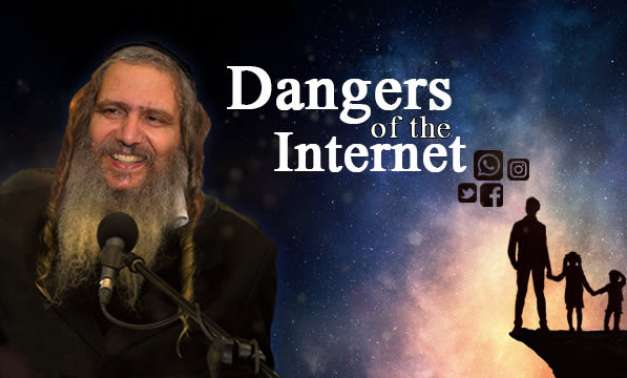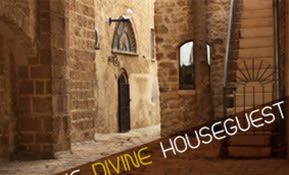
Facebook/Fakebook Survivor
Nobody would ever post things on Facebook like, “went to the bank today—was completely overdrawn,” or “had another blow up with my husband—real bummer.”

While walking in our local shopping plaza, my companion suddenly turned to me.
“Do you see that girl over there?” she said, shaking her head in the girl’s direction. I looked to see the object of her interest, and raised an eyebrow in question.
“Isn’t she skinny?!” she said. “I mean, sickeningly skinny?”
Yes. Actually she was. But what does that have to do with me?
Well, everything, actually. And nothing, truthfully.
In moments like these, I allow myself to leave the sanctity of my private domain—which I like to translate as basically my four walls; the space and boundaries that define my world, my life. I leave the challenges, tools, and situations that Hashem created specifically for me—and I peek into someone else’s life—just to see if maybe they got a better deal. I take a look over the fence of my world into another person’s ‘yard’–just to see if there is some kind of equality in Hashem’s distribution of the myriads of things and situations that make up everyone’s life. Everything from livelihood to wrinkles, to number of children, and yes, even the body mass index of the woman sitting next to me at the Chinese auction. It’s an endless game of comparisons when one looks out the window of one’s daled amos (four amot, which is 75.6 to 90.9 inches).
Take Facebook for instance. As Rivka Levy so cleverly posited and described upon it, it is actually a Fakebook. A fake representation of our ‘friends’ lives, portraying an image nothing short of perfection. It is one of the yetzer hara’s most favorite tools to drag us out of our daled amos and into the lives of people in order to trip and delude us. When Facebook was created, the Satan and his cronies had a field day, as they rubbed their hands in glee. How much easier could it have been made for them? With a couple of clicks of the computer mouse, your average Yossi could go into his friends Facebook page and come up with a million reasons why he had a much harder life by comparison, in effect erasing all feelings of gratitude he might have felt towards Hashem.
I too am a Facebook survivor. I quit Facebook when I suddenly came to the realization that not only was it becoming an addiction and a distraction (not to mention a real waste of time), but that it was causing me to take constant trips out of my daled amos – my private domain – without even leaving my house!
Everybody’s life seemed perfect in contrast to mine. Everyone posted a slew of vacation photos to exotic destinations, and their updates were always so perky—and yes, perfect.
“Woke up to a beautiful sunset—hubby and I are having a glorious vacation in Tahiti!”
Hmmm. When was the last time hubby and I took a vacation to an exotic destination? Does the corner pizza store count?
“Starting to work hard in my Pesach kitchen—potato peels, here we come!”
You mean she doesn’t have to scrub her kitchen for twenty hours, then wait another 24 hours before kashering (please consult with your local Rabbinical authority—that’s what we do in our daled amos) while family subsists on a diet of kitniot, Bamba, and kosher for Pesach potato chips?
Nobody would ever put things like, “went to the bank today—was completely overdrawn,” or “had another blow up with my husband—real bummer.” Everyone was always perfect, with a perfect family. The jagged edges of their lives were never on display. I was not privy to the problems, anxieties and hard issues that plagued all of my ‘friends’, because as Rivka Levy so cleverly described it—it was a Fake book in the end.
The last straw came on the heels of our stillbirth. Two other ‘friends’ had either given birth, or been due around the same time as me. Every time I would log on and check their status, there would be pictures of their babies, or progress reports as they approached their due date. And while I was, of course, happy for them, my humanness came to the fore, and the void that I was left with became magnified beyond measure. I was taking myself out of the safety of my daled amos— my four walls, and I was putting myself in a situation of emotional vulnerability. When a ‘friend’ from my past contacted me (whom I wanted no contact with) I pulled the plug on Fake book, and my emotional and spiritual well-being began to mend.
In today’s world of media and technological overkill, we are constantly being thrust into other people’s daled amos—for better or worse. Growing up, I was an avid fan of People magazine, because it provided me with endless hours of my favorite movie stars divorces, plastic surgeries, and subsequent failed marriages. We are a society with an insatiable appetite to know—and to be known. We need to know what goes on in people’s lives in order to see how we measure up in the Divine equality scale.
“She’s actually not as skinny as she looks—black is a very slimming color,” or “You think that couple over there is perfect? I heard he just filed for bankruptcy…” And on. And on. And on.
All of us are human. And in being human, we like to be at the top of things. We like our lives to run smooth, with no bumps along the road. And when we constantly look outside of our daled amos, we tend to think that Hashem is singling us out for punishment by giving us all of our trials and tribulations. We look at those around us and lament to ourselves that nobody has gotten as bad a break—or been so overlooked—as ourselves. It’s only when we decide to focus inward—and on the blessings in our lives—that true happiness and spiritual health can be achieved.
Whenever I look at those around me, and my yetzer hara starts to whine in my ear at the unfairness of it all—I take a deep breath and begin my trusty mantra, “Daled amos, daled amos, daled amos….” It’s pointless for me to look any further beyond my four walls, because nothing is going to change my present situation—except my attitude. The family that seems to have it so easy—unfortunately has a child struggling with his Yiddishkeit. The woman who looks so put together—her family is undergoing severe financial difficulties. The examples are endless, and so are the opportunities for self-pity. One just never knows what goes on in another person’s daled amos—and as the known Yiddish saying goes: if everyone were to put their pekelach (packages, or rather problems) down on a table, and they were told that they could choose a different package of problems from amongst all the others—they would still choose their own. Because at the end of the day, Hashem has given every one of us the house, spouse, and children, and our own sets of particular challenges—because that is what is best for us. To look into the daled amos of another is an exercise in futility.
“How pleasant are your tents,” refers to the Jews in the desert. The opening of their tents would never face one another, in order to prevent jealousy and strife. If the wife of Yankele in the dessert saw her neighbor’s new decked out camel, she might push her husband to buy them a new one. Or if Shifra’s children didn’t need OT therapy, which of course, wouldn’t you know it– was on the other side of the Jordan—while Sara’s kids did—her gratitude to Hashem for all His blessings would have been diminished.
We have to take an example from our forebears who dwelled in peace in the dessert. They looked only within the walls of their tents—and they are held as an example until today of how a Jew should strive to be.
So as the Yetzer tries without let up to deter us by putting an endless amount of spiritual obstacles in our path—step on him! Step on him (or her, I guess) and tell him (or her—or it?) you are very sorry, but you will not, absolutely not be taken on a trip out of your daled amos! Not through Facebook, not through the lady sitting next to you at the Chinese auction, nor by the neighbors seemingly ‘perfect’ family. And once you’ve dealt with that nasty intruder, run back into your daled amos and lock your windows and doors. For as Dorothy from the Wizard of Oz so aptly put it, “there is no place like home.”







12/04/2011
You make a good point but… …you can also be on Facebook and use it for a lot of good too. Like linking inspirational videos and songs, and posting quotes from Rebbe Nachman and Chazal. I know I'm the only frummie in many of my 'friends' lives and I want to be on their radar daily. BUT the addicting aspect is totally yetzer hara, and I'm trying to contain it. Wish me luck.
12/04/2011
…you can also be on Facebook and use it for a lot of good too. Like linking inspirational videos and songs, and posting quotes from Rebbe Nachman and Chazal. I know I'm the only frummie in many of my 'friends' lives and I want to be on their radar daily. BUT the addicting aspect is totally yetzer hara, and I'm trying to contain it. Wish me luck.
7/31/2011
nice to read I am very happy to find yours articles here.As always,it is a pleasure to read them. I hope you and your family are well. With care, Ilana Serber